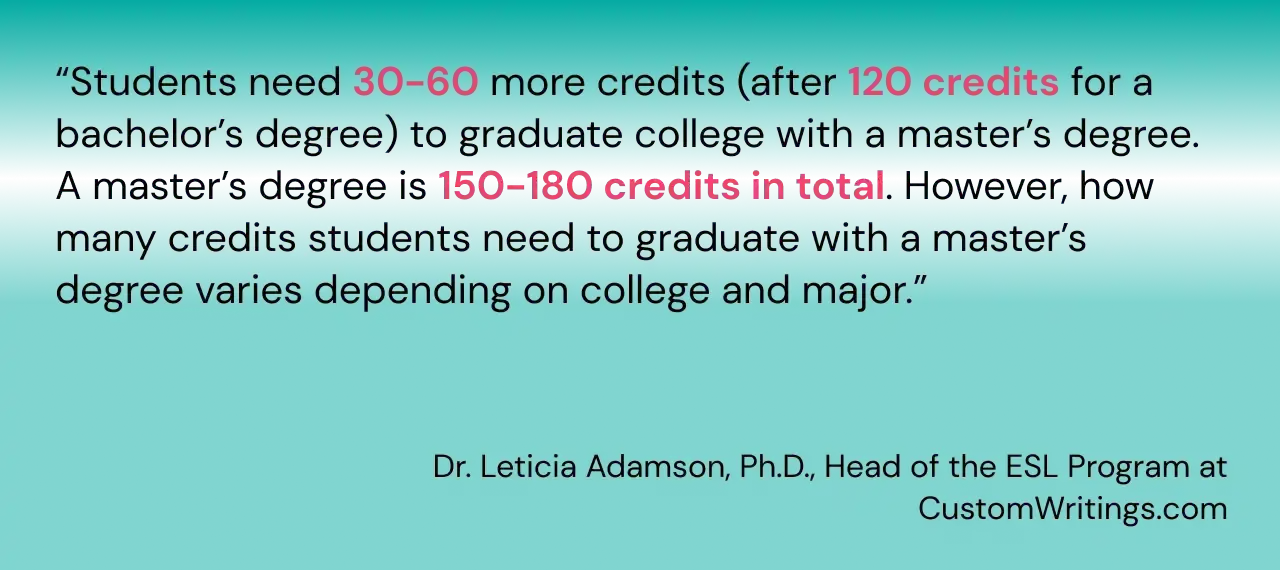The credit system is a cornerstone in the field of higher education. It is used to assess a student’s academic progress and is required for graduation. Understanding the question “How many credits do you need to graduate college” is key to navigating your educational journey successfully.
In this article, we will delve into the academic hours system, exploring the number of units needed for associate’s and bachelor’s degrees. We’ll also equip you with useful tips on how to efficiently manage your credits, to guarantee a hassle-free and effective road to your desired degree.
College Credits: What Are They and Why Do They Matter?
Imagine credits in college as building blocks on the road to your degree. Each unit represents the workload and time required to complete a particular course. As you accumulate them, you become closer to fulfilling your academic goals and eventually graduating. This structured system allows students to tailor their educational experience according to their interests and career aspirations.
The importance of college hours cannot be overstated. They serve as a tangible representation of the knowledge and skills you acquire during your school years. As you meet credit requirements, you will obtain a better grasp of your chosen subject of study and build skills that will help you in your future job.
Moreover, university units are like an academic currency that you can transfer between institutions. If you decide to switch to a different educational institution, the total amount of credits you’ve earned can significantly impact your journey toward obtaining a degree at your new institution. Additionally, academic units can be transferred between educational institutions, providing you with the flexibility to explore diverse learning environments or take advantage of specialized programs.
If you’re trying to balance academic workload and extracurricular commitments, getting external help can be a lifesaver. A reliable custom writing service can help you with tailored academic content so you get good grades while you focus on other parts of your education. Whether it’s research, essays or presentations, these services will support you throughout your academic journey.
By using professional writing services you’ll make sure your assignments meet the requirements and save time. This is especially helpful when you have multiple responsibilities like part time work, internships or extracurricular activities so you can manage your college credits better and graduate on time.
How Many Credits Is an Associate Degree?
| Degree | How many credits | Time |
| Associate of Arts (AA) | From 60 to 70 roughly | From 24 months |
| Associate of Science (AS) | From 60 to 70 roughly | From 24 months |
| Associate of Applied Science (AAS) | From 60 to 70 roughly | From 24 months |
| Associate of Business (AB) | From 60 to 70 roughly | From 24 months |
| Associate of Computer Science (ACS) | From 60 to 70 roughly | From 24 months |
| Associate of Health Sciences (AHS) | From 60 to 70 roughly | From 24 months |
How many credits for associates?
Typically, for the completion of an associate’s degree, you ought to pass from 60 to 70 credits. Generally, learners acquire 60 to 70 credits within two years of full-time study. Obviously, it will be longer if they’re studying part-time. University units are divided into many courses to provide students with a rigorous education. Their specific distribution depends on the program and the college. However, all students, without exception, are meant to devote time to fundamental education courses and in-depth learning of the major courses specific to their chosen field (e.g., business, computer science, medical sciences) and sometimes electives. Because requirements vary from program to program and institution to institution, it is extremely important to familiarize yourself with the precise requirements of the university you plan to attend.
Associate degrees are a common route among students striving for a swifter entry into the workplace and are also often taken as a foundation for further bachelor’s studies. They provide valuable skills and knowledge for various career paths and are sometimes a more affordable and time-efficient option in higher education.
Anchor: As a rule, Students seeking to obtain an Associate of Arts (AA), Associate of Science (AS), or Associate of Applied Science (AAS) degree must successfully complete around 60-70 academic units. That is your answer to the question “How many credits do I need to graduate.”
How Many Credits Is a Bachelor’s Degree?
| Degree | How many credits | Time |
| Bachelor of Arts (BA) | From 120 to 130 in total | Around 48 months |
| Bachelor of Science (BS) | From 120 to 130 in total | Around 48 months |
| Bachelor of Fine Arts (BFA) | From 130 to 140 in total | Around 48-60 months |
| Bachelor of Business Administration (BBA) | From 120 to 130 in total | Around 48 months |
| Bachelor of Engineering (BEng) | From 130 to 140 in total | Around 48-60 months |
| Bachelor of Education (BEd) | From 120 to 130 in total | Around 48 months |
| Bachelor of Nursing (BSN) | From 120 to 130 in total | Around 48 months |
A bachelor’s degree is a multi-faceted and in-depth undergraduate program spanning four years. It is carefully crafted to equip students with a deep and specialized education in a particular field of learning. To receive a bachelor’s, students must meet a set amount of college hours through a mix of major, minor, optional, and fundamental courses. This balanced curriculum guarantees students receive a firm grounding in the knowledge necessary to be a well-rounded member of society, as well as more specialized knowledge in their chosen area.
Managing your college credits is important for graduation and for future academic excellence in a master’s or doctoral program. If you’re going to pursue higher education, knowing your credit requirements early on will make the journey smoother. For those doing research projects, thesis help can be a lifesaver. These services will give you personalized guidance to make sure your work meets academic standards and aligns with your research goals.
With professional help, you can focus on the substance of your thesis without getting bogged down by formatting and structure. This will not only improve your submission but also save you time so you can focus on your coursework and achieve your academic goals. Whether you’re managing your bachelor’s degree credits or gearing up for graduate level challenges, using what’s available will make the journey smoother.
According to research conducted by the National Student Clearinghouse Research Center, a majority, 62.3 percent of full-time students, enrolled in four-year institutions successfully complete their degrees within a six-year timeframe.
How many credits to graduate college? To finish university with a bachelor’s degree, typically, students are obliged to complete 120 academic credits. They are divided among various categories, with approximately half dedicated to fundamentals (general subjects), a quarter to the major, and the remaining quarter to electives or minors.
Basic schooling courses include essential subjects like English, mathematics, social sciences, humanities, and natural sciences. The primary goal of these classes is to nurture critical thinking, enhance communication abilities, and hone problem-solving skills.
Majors are groups of specialized courses that students can take to delve more extensively into their selected area of study, immersing themselves in its intricacies and complexities.
Electives and minors offer flexibility for students to explore other subjects of interest outside/within their major. Electives allow for a more diverse educational experience, while a minor provides a focused secondary area of expertise.
There is a possibility of transferring academic hours for a bachelor’s degree. Transferred units can cut the number of hours needed to finish a degree substantially. This option is available to students who are transmitted from other educational institutions or received college-level units while in high school.
How many credits for a bachelor’s degree?
Students normally need 120-130 college units to graduate with Bachelor of Arts (BA) and Bachelor of Science (BS) degrees, which are among the most common degrees. These university hours are made up of a mix of fundamentals, major-specific courses, and optional lessons.
For specialized degrees like Bachelor of Fine Arts (BFA), Bachelor of Business Administration (BBA), Bachelor of Engineering (BEng), Bachelor of Education (BEd), and Bachelor of Nursing (BSN), the credit requirements may vary. These degrees often require additional academic hours due to their more focused and comprehensive curriculum.
How many years is a bachelor degree? For a full-time student to obtain a bachelor’s diploma it typically takes four years, but it sometimes takes five years for some specialized programs. If you decide to take more time in receiving your education, you can study part-time and receive your degree after a longer period of time.
If we are talking about a master’s degree, the answer to your question “How many credits to graduate college?” will be 30-60 academic units. This is assuming that you have a bachelor’s degree with 120 minimum university hours finished already.
If you are planning to enroll in a community college, keep in mind that not all educational institutions of this level of accreditation offer bachelor’s degree programs.
Recommended reads
Tips for Managing College Credits Effectively
- Consult your academic advisors. Your university’s academic advisors are your valuable sources of information to understand credit requirements, course sequencing, and degree planning. Regularly meet with them to discuss your academic goals, review your progress, and get advice on selecting the right subjects for your major and personal interests.
- Plan your course load wisely. Take time to map out your academic journey and plan your course load each semester. Consider your degree requirements, primary classes, and fundamentals. Balancing your college hours between different subjects and difficulty levels will help you avoid being overloaded and graduate on time.
- Maximize summer and winter courses. The majority of universities offer summer and winter sessions where you can earn academic units outside of the normal academic year. By taking advantage of these opportunities, you can earn credits, reduce your workload during regular semesters, or deepen your studies in subjects of interest without compromising your academic performance.
- Utilize transfer credits strategically. Define whether any previous higher-education-level courses or attendance at another university can be repositioned to your present program. Transferring eligible academic hours can save you precious time and funds, allowing you to focus on more advanced coursework or explore additional elective options.
- Stay organized and monitor your progress. Keep track of your credit progress throughout your college journey. Use tools like degree audits and academic tracking software provided by your institution to monitor completed and remaining units. Staying organized ensures you know your academic standing and know the answer to the question “How many college credits do you need to graduate.” This is vital for making informed decisions and preventing any surprises during graduation preparations.
By following these essential tips, you can effectively manage your college credits, optimize your academic experience, and pave the way for your successful graduation.






